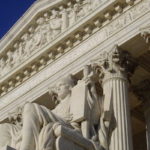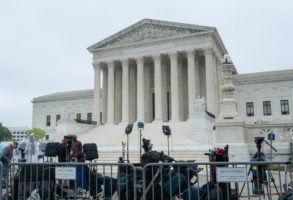Published June 11, 2015
Ilya Somin’s thesis in his Liberty Forum essay is modest and hedged. Confining himself to “the circumstances of the United States for the foreseeable future,” he argues only that, among the “plausible competitors,” originalism is “likely to be” the theory of constitutional interpretation that best protects the components of “ ‘negative’ liberty defended by most libertarians: the right to be free of government interference with one’s economic and personal lives.”
Given the robust competition among different concepts of liberty, and the intense disagreement over other values that constitutional interpretation should advance, Somin makes clear that he is not making the much more ambitious argument that originalism is “best overall” in advancing some aggregate set of values.
I have little interest in either embracing or contesting Somin’s core thesis. I will instead offer three sets of observations, on 1) the normative justification for originalism; 2) democratic self-government; and 3) sound judicial deference.
First, the normative aspect. Whether a method of interpretation succeeds in gleaning the meaning of a legal text is a different question from whether those purportedly governed by that legal text should accept that meaning as binding. As law professor Lawrence Solum puts it, the first is a “claim about meaning,” whereas the second is a claim about the “moral significance” of that meaning.[1]
Somin’s essay, as I understand it, bears only on this second question. His evident goal is to persuade his fellow libertarians, and others who place a high value on negative liberty, that they should be inclined to accept an originalist reading of the Constitution as morally binding. Why? Because an originalist reading, according to his argument, is more likely than competing interpretive methodologies to protect negative liberty.
Somin’s consequentialist justification for originalism strikes me as weak (even beyond its admitted incompleteness) and disabling. What I find especially curious is that he does not build on any claim that originalism, or some version of it, accurately interprets the meaning of the Constitution.
The proposition that originalism is the soundest method of constitutional interpretation cannot, by itself, establish that the constitutional readings it generates are morally binding on Americans. But, unlike Somin, I would make this proposition an essential part—indeed, the principal part—of my normative justification. All that needs to be added to it, I would suggest, is something like the “fidelity thesis” that Lawrence Solum sets forth: namely that,
in a reasonably just society, citizens, officials, and judges should adopt an attitude of loyalty towards the law and comply with a corresponding obligation to comply with the law absent overrid[ing] reasons of morality.[2]
To put my point somewhat differently: I agree with Somin that the normative justification for an interpretive theory—in his words, why “we should obey” it—depends on “some value or set of values external to the text itself.” Somin seems to think that this means that the normative choice among competing theories must rest on an assessment of their consequences, “on their effectiveness in promoting specific values.” But I would instead invoke the external value that, in a reasonably just society, it’s presumptively wrong to lie about, or to misstate, what the Constitution means.
Somin’s exclusive focus on consequences would severely impair him in contesting the competing consequentialist claims made by proponents of other interpretive theories (if indeed the term “interpretive” can even be sensibly applied to living-constitutionalist theories that leap as quickly as possible away from constitutional text). These proponents will of course have their own conceptions of liberty and other values that they think constitutional theory should advance. On what basis can Somin argue that his normative justification is more compelling than theirs—if, that is, he doesn’t build on an underlying claim that originalism is more accurate in generating the real meaning of the Constitution?
Second, democratic self-government: Somin argues that the libertarian concept of negative liberty is better protected by a “nondeferential”—I would say “activist”—originalism than by an originalism that “largely defer[s] to the political process.” If, as I gather to be the case, the libertarian concept of negative liberty gives little weight to the liberty to engage in collective self-government, then Somin’s argument, on its narrow terms, is surely right, at least in the short and medium terms. After all, an activist version of originalism gives those who have lost through the democratic process a greater chance of victory through the courts than a deferential version would.
I’m much less persuaded that nondeferential originalism is an effective guarantor of the libertarian understanding of liberty in the long run. Among other things, libertarian promotion of an activist role for the judiciary will have the predictable (though unintended) effect of providing rhetorical cover for an aggressive Progressive judicial activism that is deeply hostile to the libertarian understanding of freedom. Further, a citizenry that is infantilized by a hyperactive judiciary will be less and less able or inclined to discharge whatever responsibilities are left to it.
Let me here say a few words in praise of the liberty to engage in collective self-government. That liberty lies at the core of the historic American experiment in representative government, in what Lincoln hailed as “government of the people, by the people, for the people.” In our pluralistic society, representative government is our means of peaceably working out, over time and within the broad bounds set by the Constitution, which contested liberty interests are properly part of ordered liberty. The processes of representative government encourage and reward the accommodation of competing interests. They invite citizens to persuade each other. And they give the losing side the consolation that the battle has been fairly fought and the hope of rebuilding to earn a victory in the future.
I of course acknowledge that the democratic process is imperfect and has sometimes generated horrific results. But the same can be said of government by judiciary, as Dred Scott and Roe v. Wade amply illustrate. (Somin’s references to the “political process” and the “political branches” might be misread to suggest that improper political considerations have not infected the judicial realm.) Given the state of our culture, I’m no more hopeful than Somin is about how representative government will play out in the foreseeable future. But I believe that the liberty to engage in the democratic processes has much greater value than Somin seems to accord it.
Third, sound judicial deference: I am very puzzled by how Somin draws the line between nondeferential originalism and deferential originalism. I would have thought that the line would largely track the divide between libertarian originalists (a group that includes Somin) and originalist proponents of judicial restraint (a group in which I would place myself).
Many libertarians, I think it’s fair to say, invoke a “presumption of liberty” (Randy Barnett’s phrase) or some other rubric to displace the “presumption of constitutionality” that is ordinarily thought to attach to democratic enactments. The goal—or at least the effect—is to shift the burden of proof away from those challenging a law to those defending it. Other libertarians, while stopping short of burden-shifting, lower the burden and invite judges to invalidate laws that conflict with a mere “likely” or “best” reading of the Constitution, even if that likely or best reading is far from clear. (A reading that is only 51 percent likely would be a “best reading.” If there are four alternative readings of a constitutional provision, three of which would sustain the law, a fourth reading that is only 26 percent likely to be correct might be the best reading.) Under either of these two libertarian approaches, a law that can’t be said to clearly violate the Constitution would nonetheless be invalidated.
By contrast, those of us who advocate judicial restraint typically argue, as one law professor well known to readers ofLaw and Liberty recently put it, that judges should “decline to displace legislation unless it conflicts with a meaning of the Constitution that can be clearly ascertained after applying all legal methods.” [Emphasis added.]
Somin instead draws the line between “some” (unidentified and uncited) who are said to argue that originalism “supposedly requires deferring to the legislature in all but the most clear cases of unconstitutionality,” [emphasis added] and folks like John McGinnis who, according to Somin, maintain that “judges should only defer in cases where they could not find the answer to a constitutional question by using standard methods of legal interpretation.” In the last clause, note the lack of any standard of clarity accompanying “the answer.”
The line Somin draws doesn’t accurately distinguish a nondeferential originalism from a deferential originalism—nor does it separate the common libertarian approach from the typical position of judicial restraint. As Somin’s footnote citation to John McGinnis’s Law and Liberty post (“Why Thayer is Clearly Mistaken about Judicial Restraint”) reveals, McGinnis was arguing only against what he labeled the “strong deference” rule famously proposed by 19th century law professor James Bradley Thayer.
As McGinnis spells out in that post, and in the underlying article—“The Duty of Clarity”—from which it is drawn, under Thayer’s rule “legislation should be struck down only if it violated what any rational person”—not any well-informed judge—“would believe the Constitution to mean.” Further, if there was “any lack of clarity on the face of a [constitutional] provision,” judges shouldn’t resort to interpretive methods that might resolve the lack of clarity and render a statute unconstitutional; they should instead simply apply the statute. (As McGinnis discusses, Thayer wasn’t an across-the-board advocate of judicial deference: His rule applied to federal judicial review of federal laws. He argued against any federal judicial deference to the question whether state laws violated the Constitution.)
So far as I’m aware, of the many originalist proponents of judicial restraint, there are few if any actual “Thayerians.” (Two particularly well-versed originalists have privately identified for me one possible candidate.)
Somin mischaracterizes McGinnis’s approach and wrongly invokes him in support of the supposed compatibility of originalism and nondeferential judicial review. The statement of judicial restraint from the unnamed law professor that I cited above—about not displacing legislation unless it falls foul of a meaning of the Constitution that can be “clearly ascertained after applying all legal methods”—is from McGinnis in “The Duty of Clarity.” McGinnis expressly locates his “originalist position” between “Thayerian deference” and “no deference,” and aptly calls his approach “a deference theory.” Directly contrary to what Somin’s citation of his work conveys, McGinnis argues that nondeferential judicial review is indeed (to use Somin’s phrase) “antithetical to originalism itself.”
A closing observation: Some libertarians sometimes invite the suspicion that their commitment to originalism is opportunistic—that, for them, originalism is something to be invoked and to be twisted, this way and that, to constitutionalize their policy preferences. A normative justification for originalism that does not build on the essential rightness of originalism as a method of interpretation, but that instead looks exclusively to the consequences that originalism yields, does not help to dispel that suspicion. And a libertarian defense of an activist judicial role, along with a shrunken vision of the realm of the democratic process, tends to feed that suspicion.
[1] Lawrence B. Solum, “Semantic Originalism,” Illinois Public Law and Legal Theory, Research Papers Series No. 07-24, November 22, 2008, p. 126.
[2] Ibid., p. 149.
Edward Whelan is president of the Ethics and Public Policy Center and a regular contributor to National Review Online’s Bench Memos blog on judicial matters.









